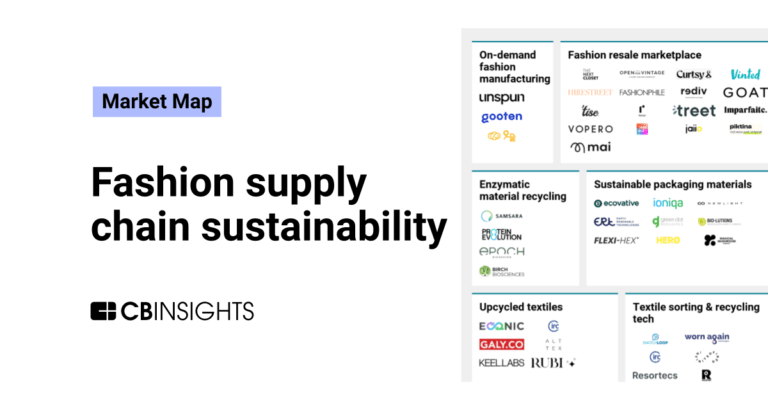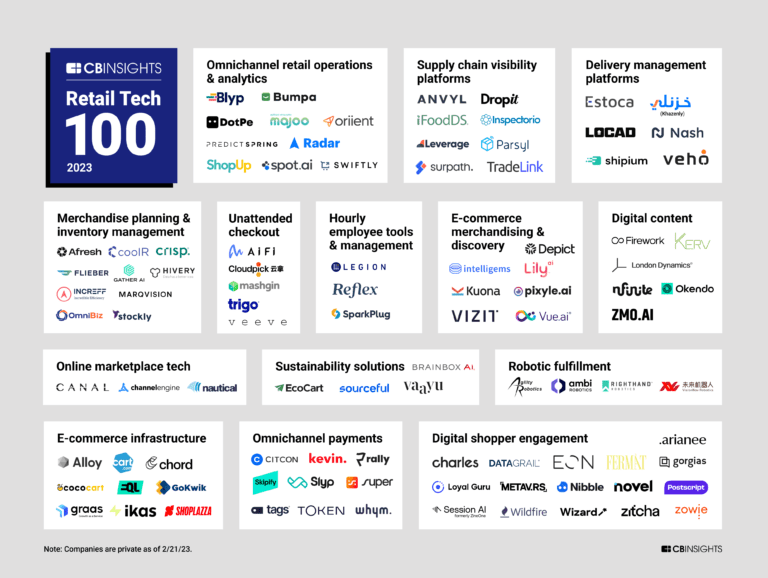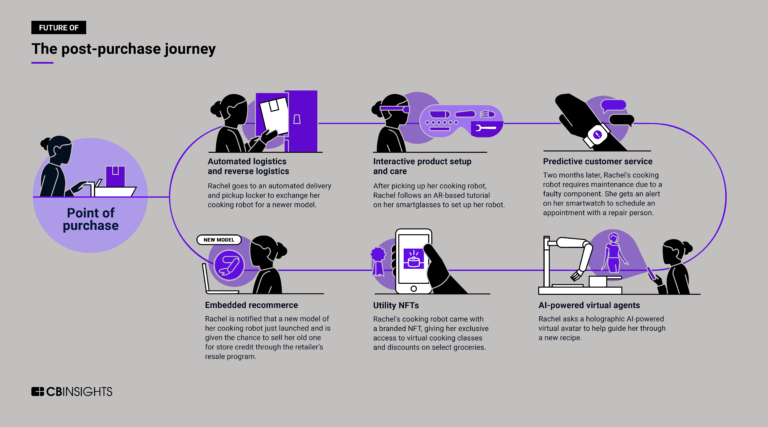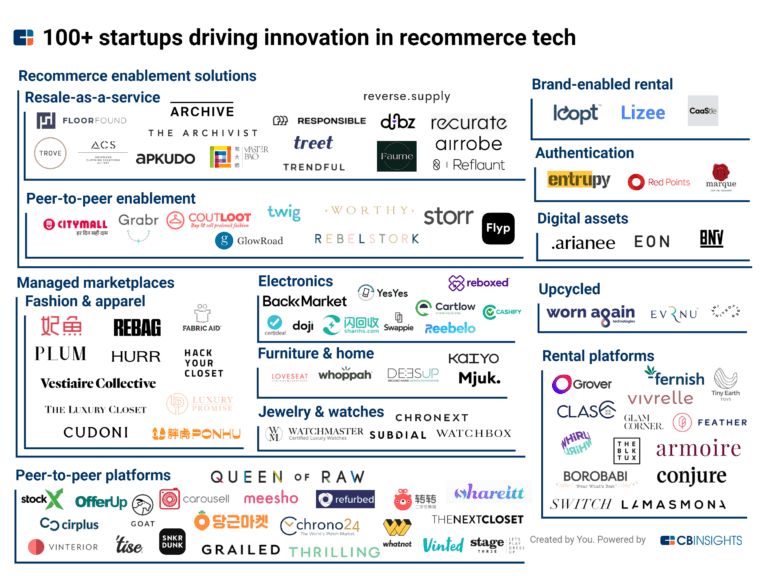
EON
Founded Year
2016Stage
Series A | AliveTotal Raised
$12.23MLast Raised
$10M | 3 yrs agoMosaic Score The Mosaic Score is an algorithm that measures the overall financial health and market potential of private companies.
-84 points in the past 30 days
About EON
EON specializes in enterprise digital ID technology within the retail and fashion sectors. The company offers a platform for product digitization and traceability, as well as a marketplace for pre-integrated applications, services, and business partners. EON's solutions enable end-to-end product traceability, compliance with sustainability and ESG standards, enhanced customer engagement, and brand protection. It was founded in 2016 and is based in New York, New York.
Loading...
ESPs containing EON
The ESP matrix leverages data and analyst insight to identify and rank leading companies in a given technology landscape.
The product & packaging authentication tech market addresses issues like counterfeit products, product diversion, and lack of traceability. Current anti-counterfeiting measures such as bar codes, QR codes, tags, and stickers can be erased, lost, damaged, moved from part to part, and counterfeited. As a result, this market offers solutions that enable product authentication via smartphone applicati…
EON named as Challenger among 15 other companies, including Oritain, Kezzler, and TrusTrace.
EON's Products & Differentiators
Product Cloud Platform — A CRM for Products
Like a CRM for your products, EON enables brands to capitalize on physical products — increasing profitability, traceability and customer engagement through Digital ID technology. With EON’s comprehensive operating system for each product, brands power enhanced product capabilities and drive all interactions across the product’s entire lifecycle. A Digital ID, or Digital Product Passport, is a digital twin of a physical product that links the digital and physical. EON delivers an API-first end-to-end product data management layer for item-level product data capture, transformation, validation and broadcast.
Loading...
Research containing EON
Get data-driven expert analysis from the CB Insights Intelligence Unit.
CB Insights Intelligence Analysts have mentioned EON in 5 CB Insights research briefs, most recently on Jul 26, 2023.

Jul 26, 2023
The fashion supply chain sustainability market map
Mar 14, 2023 report
Retail Tech 100: The most promising retail tech startups of 2023

Mar 21, 2022
100+ startups driving innovation in recommerce techExpert Collections containing EON
Expert Collections are analyst-curated lists that highlight the companies you need to know in the most important technology spaces.
EON is included in 3 Expert Collections, including Packaging & Labeling Tech.
Packaging & Labeling Tech
629 items
Companies providing traditional and tech-enabled packaging and labeling solutions for brands.
Retail Tech 100
100 items
The most promising B2B tech startups transforming the retail industry.
E-Commerce
87 items
Latest EON News
Mar 10, 2022
Proponents of the effort to give every item its own digital identity say they’ll unlock numerous benefits for brands and shoppers alike. But for these IDs to work will require overcoming some big obstacles first. Eon's digital ID. (Eon) Key insights A host of startups and other players are working to solve the challenge of giving every item its own digital identity These digital twins could unlock a huge range of benefits for brands and shoppers alike, proponent say But the efforts face big challenges like tagging millions of items, working with data that isn't uniform and getting customers to use the digital twins If an array of start-ups and fashion power players have their way, in the future every item of clothing, watch or handbag you buy will have a digital twin. Scan a QR code on a garment and it would pull up a web page packed with information about that item, from the materials used to styling suggestions and perks, like access to exclusive products. The same web page could even link out to a resale partner, so you can easily list your purchase for sale once you’re done wearing it. If you were the buyer of that used item, you could verify its authenticity by seeing the previous owners going back to its maker. And perhaps, if you were that maker, you could get a royalty every time the item was resold. A product existing at the centre of its own ecosystem of data and services is well-established in other markets, particularly big-ticket, tech-heavy items like cars. But fashion has only dabbled in the idea, such as using RFID tags for inventory tracking in a warehouse. Interest in giving products individual IDs is growing , however, especially as companies and consumers get more comfortable using blockchain technology to unlock new opportunities. Breitling is now issuing blockchain-based digital passports for its watches with features like proof of authenticity and service notifications. Blockchain also powers Hublot’s electronic warranties, which customers activate by taking a picture of their watch with a phone. It’s still a long way from being standard in fashion, though. For certain items made in limited quantities, such as luxury watches, assigning a digital ID is relatively straightforward. But the biggest brands can put millions of items on the market each year, each of which would need a tag such as a QR code or NFC chip. Getting the setup right still leaves the biggest question unanswered: whether customers will use them. Brian Kilcourse, managing partner at the research and advisory firm Retail Systems Research, put it this way: “It has to be more valuable to use it than to ignore it. Consumers aren’t kicking up their heels about this stuff.” Bridging Physical and Digital A host of start-ups are trying to make digital twins commonplace. Many taking on the task, such as Lablaco and Arianee, rely on blockchain for the undertaking, associating each item with its own non-fungible token, or NFT. It’s a method also used by the Aura Blockchain Consortium, a nonprofit formed by luxury power players including LVMH, Prada and Richemont-owned Cartier. Aura has registered “double-digit millions” of products on its private blockchain, Daniela Ott, general secretary of Aura, told BoF last year. Eon, which recently received funding from Imaginary Ventures, the venture firm of Net-a-Porter founder Natalie Massenet and investor Nick Brown, creates IDs that aren’t blockchain-based but says brands can still log them on any blockchain they want. But to make digital IDs as useful as possible requires establishing common standards so each digital ID platform isn’t a closed system with a limited set of capabilities. Brands already have much of the information needed to give their products a basic digital identity in their inventory-management systems, but the data needs to be extracted and processed. Eon’s partners plug into its platform via an API. They so far include luxury and designer businesses, like Yoox Net-a-Porter and Gabriela Hearst, and mass-market retailers such as Target. “All the product data is basically in a vault,” said Natasha Franck, Eon’s founder and chief executive. “We’re saying, ‘okay, there are five million of this sweater in this size, in this colour, produced at this factory.’ And we generate the five million unique, serialized IDs.” The information can be embedded in a QR code, NFC chip or RFID tag and attached during manufacturing. The exact form varies by product. Clothing might get a QR code beside its washing instructions but a handbag might have an NFC chip sewn into it. Eon aims for its platform to be useful at different times in a product’s life. Sustainability information or styling suggestions can be helpful when a customer is shopping. The same menu offering those selections could also provide an option to resell the garment through a participating reseller or guide the user to a textile recycler if the item no longer has resale value. Aura has imagined using digital IDs to enhance the storytelling around luxury goods. Ott said her dream is to show video of the actual person who made a watch or a bag. Lablaco is working to link its digital IDs to virtual versions of the garments. “They can be used for augmented reality experiences such as try-ons,” said Lorenzo Albrighi, Lablaco’s co-founder and chief executive. Lablaco's virtual world. (Lablaco) The company is even building a virtual world where the digital twins can be worn, though its main focus is enabling circularity. H&M trialled its technology for a rental program at a Berlin store last year and it recently worked with Weinsanto on a collection for Dover Street Little Market in Paris. The clothes have “timelines” where their owners can record memories and other content. (Lablaco said it is migrating from the Ethereum blockchain to the less energy-intensive Flow blockchain.) Scaling Up A challenge all players creating digital IDs face is making them as functional as possible. “A product ID is not valuable at all unless it connects to other applications,” Franck explained. It’s why Eon is building a network of partners for its digital twins to link to. Arianee made its protocol open-source for any developer to use. Lablaco is now trying to build an open-ended platform. Its first partner will be FibreTrace, which allows companies to track materials through the supply chain, Albrighi said. More utility may prove key to getting consumers to use these digital identities. “We’re just in very early days,” said Sucharita Kodali, a vice president and principal analyst at Forrester. “They’re building the data layer right now. There needs to be a user layer.” Rival companies may not always cooperate though and may not want to be on the same platform. If digital IDs don’t provide enough value for consumers to pay attention to, it’s uncertain how long brands will devote resources to them. But proponents argue they’ll unlock benefits for brands and shoppers alike. In a recent interview with BoF about Imaginary Ventures’ investment in Eon, whose board she is joining, Massenet described digital IDs as a way to bring physical fashion into web3, an envisioned evolution of the internet toward a decentralised architecture powered largely by blockchain. She likened creating the IDs to laying the railroads at the start of the Industrial Revolution. In her view, commerce has steadily moved away from a centralised model where the consumer, the product and the retailer are together in one location. E-commerce made the product into a data point; the shopper didn’t need to be physically near it and it could be stored in a warehouse. The rise of marketplaces made it so the retailer didn’t even need to own the product, and the spread of peer-to-peer commerce has further decentralised shopping. In this context, products need their own distinct, digitised identities. “We are at the dawn of so many new developments in retail that are going to transform how consumers, brands and businesses interact,” she said. FURTHER READING
EON Frequently Asked Questions (FAQ)
When was EON founded?
EON was founded in 2016.
Where is EON's headquarters?
EON's headquarters is located at 11 West 30th Street, New York.
What is EON's latest funding round?
EON's latest funding round is Series A.
How much did EON raise?
EON raised a total of $12.23M.
Who are the investors of EON?
Investors of EON include Imaginary Ventures, Plug and Play and The Circulars.
Who are EON's competitors?
Competitors of EON include Verofax, Provenance, Legitimate, Fairly Made, Crystalchain and 7 more.
What products does EON offer?
EON's products include Product Cloud Platform — A CRM for Products.
Loading...
Compare EON to Competitors
Made2Flow is a technology company focused on environmental impact measurement and supply chain decarbonization within the fashion industry. The company offers solutions for data gathering, validation, and analysis to facilitate sustainable supply chain development and help brands achieve their science-based targets. Made2Flow primarily serves fashion brands and suppliers seeking to reduce their environmental footprint and comply with industry regulations. It was founded in 2019 and is based in Ludwigsfelde, Germany.
Trace For Good is a company specializing in supply chain traceability and CSR data management software within the textile industry. The company provides a platform that enables fashion brands and suppliers to collaborate and manage social and environmental data, ensuring transparency and compliance. Trace For Good primarily serves the textile and fashion industry, offering solutions that facilitate the collection, verification, and sharing of supply chain information. It is based in Paris, France.
Crystalchain focuses on traceability solutions, operating in the technology and supply chain management sectors. The company offers a range of services including compliance solutions, complete traceability solutions, and carbon project certificate management, all aimed at enhancing transparency and trust. These solutions are primarily targeted at various sectors including luxury, agriculture, fashion, and circular economy. It was founded in 2016 and is based in Paris, France.

DUST Identity focuses on creating identity and authentication platforms. The company's main product is the Diamond Unclonable Security Tag (DUST), a technology that uses microscopic engineered diamonds to create an identity layer on any object, ensuring trusted data and verifiable products are used and traced across their lifecycle. DUST Identity primarily serves sectors such as aerospace and defense, art, collectibles, part suppliers, and more. The company was formerly known as Diamond Nanotechnologies. It was founded in 2018 and is based in Newton Center, Massachusetts.
Blockchain Solutions is a technology company that operates in the blockchain industry. The company offers a range of services, including a blockchain-enabled digital financing platform, product traceability solutions, a B2B marketplace, and tokenization services. The company's services primarily cater to businesses looking to improve efficiency and expand their reach. It is based in Singapore.
ShipChain is a company focused on supply chain management within the logistics and transportation industry. They offer a software-as-a-service (SaaS) platform designed to streamline supply chain operations, enhance efficiency, and reduce costs through features like real-time tracking, inventory management, and compliance and security protocols. The platform primarily serves businesses looking to optimize their supply chain and logistics processes. It was founded in 2017 and is based in Greenville, South Carolina.
Loading...
